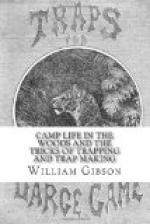With the above hints for a “rough and ready” campaign, we think the young trapper ought to be able to get along quite comfortably.
We will now pass on to the consideration of what the average [Page 234] professional trapper would call “luxuries.” The stock of these depends much upon the location of the trapping ground. If accessible by wagon or boat, or both, they may be carried in unlimited quantities, but when they are to be borne on the back of the trapper through a pathless wilderness of miles, the supply will, of course, have to be cut short. When two or three start out together it becomes much easier, one carrying the traps and tools; another the guns, cooking utensils, etc.; the third confining his luggage to the food. One of the most necessary requisites for a journey on foot consists in a knapsack or large square basket, which can be easily strapped to the back of the shoulders, thus leaving the hands free. Matches are absolutely indispensable, and a good supply should be carried. They should always be enclosed in a large-mouthed bottle with a close fitting cork, to prevent their being damaged by moisture. For further safety in this regard the matches may be rendered perfectly water-proof by dipping their ends in thin mastic or shellac varnish. If not at hand, this varnish can be easily made by dissolving a small quantity of either sort of gum in three or four times its bulk of alcohol. It is well to dip the whole stick in the solution, thereby rendering the entire match impervious to moisture. Lucifer matches are the best, and, when thus prepared, they may lay in water for hours without any injury. It is a fearful thing to find oneself in the wilderness, cold and hungry, and without the means of lighting a fire, and to prepare for such an emergency it is always advisable to be provided with a pocket sun glass. So long as the sun shines a fire is thus always to be had, either by igniting a small quantity of powder (which the trapper is always supposed to carry) or using powdered “touch wood” or “punk tinder” in its place. Fine scrapings from dry wood will easily ignite by the sun glass, and by fanning the fire and adding additional fuel it will soon burst into flame. In cloudy weather, and in the absence of matches, a fire may easily be kindled by sprinkling a small quantity of powder on a large flat stone, setting a percussion cap in its midst, and covering the whole with dry leaves. A smart strike on the cap with a hammer will have the desired result, and by heaping additional fuel on the blazing




